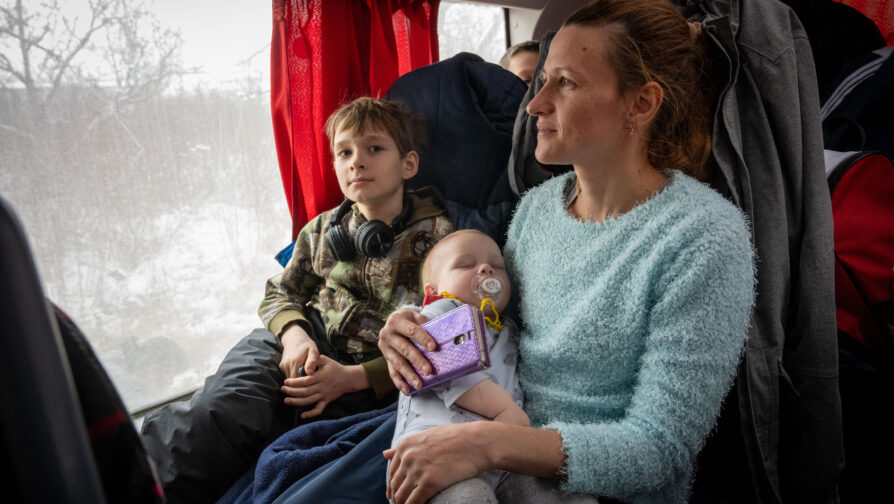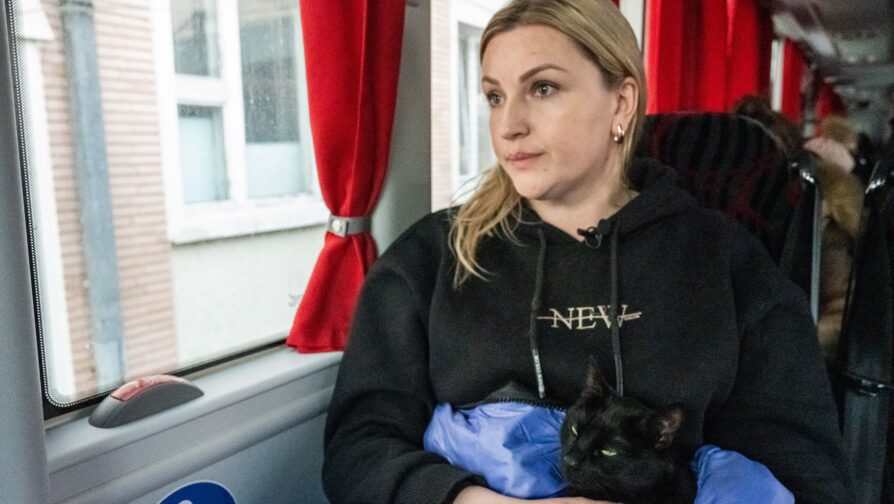Refugees fleeing Ukraine to Moldova find onward passage to Romania
Under leaden skies at the remote Palanca border crossing in southeastern Moldova, groups of refugees from Ukraine brave the bone-chilling wind as they watch their bags and other belongings being loaded onto five waiting buses for the five-hour journey to Huși in Romania.
They are among 250 refugees including older people, families with young children and lone women being prioritized for transfer to Romania from Moldova – a country on Ukraine’s southern border with limited resources to deal with the hundreds of thousands of refugees that have arrived there in recent weeks.
Once all the passengers are finally on board, the sun briefly breaks through the clouds, throwing the gray surroundings into dazzling focus as the convoy moves off. Some of the travelers give in to exhaustion and sleep, while others check their phones for news of loved ones back in Ukraine.
“The worst has befallen us.”
Natalia holds her sleeping 8-month-old daughter in her arms, with her 6-year-old son sitting in the window seat alongside. The 35-year-old accountant fled the city of Mykolaiv along with three friends and their children. All four women have left their homes and their husbands behind.
“The worst has befallen us,” Natalia says, holding back tears. Before joining up with the rest of the group for the two-day journey to the border, she and her family spent days sheltering in a bunker in the city. “Many times, there were bombs, artillery, rockets, and attacks. Our children were very scared,” she says, adding that she wants to be able to go home “maybe in two or three weeks,” but more in hope than conviction.

Natalia, 35, and her two children ride the bus to to Huși in Romania after fleeing to Moldova from their home in Mykolaiv, southern Ukraine. © UNHCR/Mihai Eremia
On another of the buses, Viktoria, 37, sits by herself with a black cat wrapped in a coat on her lap. On the second day of fighting, she sent her teenage daughter from their home in Odesa on an evacuation flight to Turkey with her sister and brother-in-law. She now plans to join another sister living in Italy before travelling to Istanbul to collect her daughter.
“My cat was allowed to cross the border. It is a blessing that we can bring our pets with us as I do not have veterinary documents,” Viktoria says. “This cat is a member of our family. We found her on the street a year ago, [she is] a stray.”
Despite knowing that her daughter is safe and escaping herself, Viktoria is unable to relax. “All this is so scary. I have crossed the border now, and I still do not feel safe,” she says. “Honestly, I do not feel relieved. Relief will come when the war ends.”

Viktoria, 37, took the family cat with her when she left her home in the Ukrainian Black Sea port of Odesa. © UNHCR/Mihai Eremia
The bus transfers have been arranged as a gesture of solidarity with the people of Moldova by the governments of both countries, and with the support of UNHCR, the UN Refugee Agency, and IOM, the International Organization for Migration. Up to three convoys per day have departed from Palanca since the first on 10 March, and will continue as long as necessary to reduce congestion at Moldova’s border and protect women, girls and others from risks including human trafficking and gender-based violence.
“Romania is helping Moldova to move refugees to its territory,” explains Roland Schilling, UNHCR Representative for Central Europe. “This is urgently needed because Moldova has already seen an influx of 300,000 people, of which 110,000 are staying. This is a tremendous burden for a small country like Moldova, with limited resources.”
Staff from UNHCR and IOM are on hand throughout the journey, offering advice to those trying to decide what to do next and providing information on subjects from securing medicines to booking free travel tickets and finding SIM cards.
“This is the first convoy today taking people from the border of Moldova-Ukraine to Romania,” says Batyr Sapbyiev, a protection officer at UNHCR Romania, who rode on one of the buses. “This is very important because it helps decongest the situation. Moldova is very crowded, and the reception capacity is overwhelmed. Services will be provided in Romania and people will choose whether they remain or continue to other countries.”
- See also: UN supports initiative to fast-track transfer of people fleeing Ukraine to Romania through Moldova
When the buses reach Huși, a city a few kilometres inside Romania’s eastern border with Moldova, the refugees are welcomed at a transit centre by the Romanian Emergency Situations Department, with support from UNHCR and IOM staff. Some of them will spend the night here, while others plan to head to the capital Bucharest or other cities.
Among those heading onwards is 16-year-old Mihail, also from Odesa, who is travelling with his mother to stay with an aunt in Slovakia. “Before I left Odesa, in my school we talked about security measures, we were told what we have to do if we hear the air-raid siren, where we have to hide, how we are supposed to provide first aid and so on,” he says.
“Before the war, I saw my future as rainbow-coloured and bright. I was about to finish 11th grade and pass the mandatory exams. But now … there is practically no studying, so I am missing a big part of the curriculum,” Mihail adds. “When the war ends completely in Ukraine, we will return immediately. I truly want that to happen as soon as possible.”
Page 3 of 10
-

UNHCR and Orange Foundation empowers digital learning in Moldova’s schools
22 Nov 2024Chisinau, 19 November 2024 — Gloria Theoretical High School marks a significant step in enhancing digital education for students and teachers in Moldova. Through a partnership between the Orange Foundation and the United Nations Refugee Agency (UNHCR), 30 schools across the country will receive digital tools to improve the learning […]
-

UNHCR Cash Assistance Program: A lifeline for Refugees from Ukraine in Moldova
30 Oct 2024A glimpse of life before the war Yulia Ivashutkina, 50, is originally from Zaporozhe, Ukraine, but in recent years, she lived in Kyiv with her family. She worked in a private kindergarten and was raising two children—a son who had just started learning to play the trumpet, and a young […]
-

The People of Moldova Receive an Honourable Mention for Remarkable Humanitarian Efforts in the 2024 UNHCR Nansen Refugee Award
9 Oct 2024The people of the Republic of Moldova will receive an honourable mention at the 2024 UNHCR Nansen Refugee Award for going above and beyond the call of duty to protect refugees who sought safety in the Republic of Moldova after fleeing the full-scale war in Ukraine. This recognition highlights Moldova’s […]
-

Five trailblazing women win UNHCR’s Nansen Refugee Awards for their life-changing work
9 Oct 2024Five trailblazing women – a nun, an activist, a social entrepreneur, a volunteer aid worker and an advocate for ending statelessness – will be honoured as winners of the 2024 UNHCR Nansen Refugee Award from UNHCR, the UN Refugee Agency. This year’s global laureate, Sister Rosita Milesi, is a Brazilian […]
-

From Odesa to Chisinau: How Ukrainian Children Found a New Home Through Sports in Moldova
26 Sep 2024After fleeing Odesa due to the war, Ukrainian children are finding hope and joy in Chisinau through football. Thanks to the efforts of Victoria and Gennady Oleksich, Sporting Chisinau now provides a new start for over 100 children from both Moldova and Ukraine. Over 100 children train passionately at the […]
-

Regional dialogue on protection and inclusion of ethnic Roma refugees and host communities
31 Aug 2024On 11-12 April 2024, during “Amare Amala: Roma Culture Week” in the Republic of Moldova, the Ministry of Education and Research (MER) of the Republic of Moldova, the Agency for Inter-Ethnic Relations, the United Nations High Commissioner for Refugees (UNHCR) and the Roma Task Force, with the support of the […]
-

Olena’s stand-up paddle board club, a refugee success story in Moldova
26 Aug 2024Olena Prysyazhniuc’s journey from a refugee to a successful entrepreneur is a testament to how passion and hard work can transform lives. Adapting to life in the Republic of Moldova Originally from Vinnytsia, Ukraine, Olena worked at the Vinnitsa City Council, where she coordinated a program dedicated to the socialization […]
-

Apply to UNHCR and Contact Center Capacity Building Program in Moldova
12 Aug 2024UNHCR and NGO CONTACT Center are inviting you to take part in a Capacity Building Program in Moldova. This program aims to support national and local civil society organizations, grassroots volunteer groups, and representatives of the local public authorities in Moldova by developing their knowledge and capacity to address local […]
-

UNHCR is grateful to the Government of Norway for supporting refugees from Ukraine in Moldova
26 Jul 2024UNHCR, the UN Refugee Agency, welcomes a contribution of NOK 30 million ($2.7 million) from Norway to support refugees from Ukraine in Moldova. This is the second-largest contribution to UNHCR in Moldova over the past two years. This important funding to sustain UNHCR’s operations in Moldova is part of the […]
-

UNHCR and Chisinau City Hall Sign Memorandum of Understanding to Strengthen Support and Integration for Refugees
3 Jul 2024Chisinau, 18 June 2024 – The Office of the United Nations High Commissioner for Refugees (UNHCR) and Chisinau City Hall have signed a Memorandum of Understanding aimed at enhancing support and integration for refugees, asylum seekers, and stateless persons within the local community. The Memorandum was signed by Bertrand Blanc, […]
